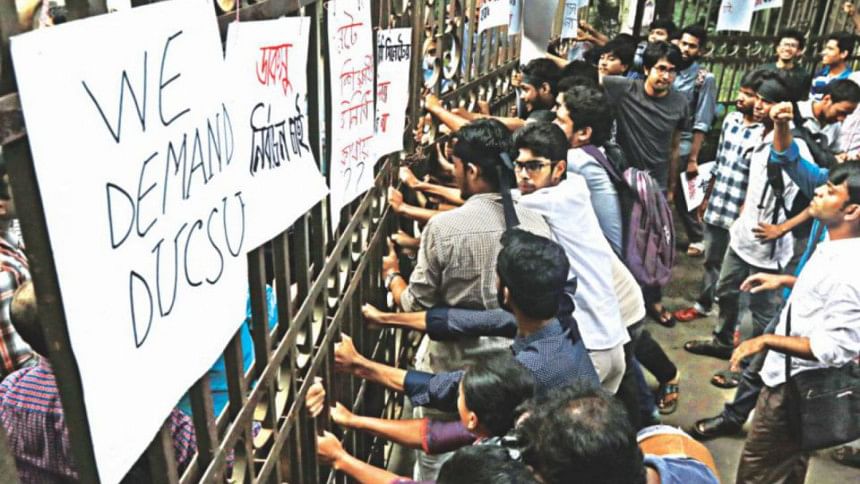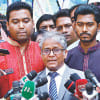The DUCSU conundrum

It's been 27 years since the last election of the Dhaka University Central Students' Union (DUCSU) was held. First held in 1924, DUCSU elections have taken place even under the most arduous circumstances, during the Pakistani rule and even with the military regimes in power in independent Bangladesh. Ironically, the practice of election in this most prestigious student body of the country was brought to a halt after our ascent to democracy in 1991.
One of the most significant contributions of DUCSU was to produce a number of high-profile student leaders who later emerged as national leaders. Most importantly, DUCSU leaders led some of the most important political movements in our history—the language movement in 1952, mass uprising in '69, the liberation movement in '71, and the anti-autocracy movement in '91.
So why was such a powerful stronghold of democratic consciousness stripped of an element—election—that defines any democratic entity? The Dhaka University authorities have come under repeated criticism for their failure to hold the election over the years. Even President Abdul Hamid emphasised the importance of holding the election—"DUCSU election is a must"—while addressing the 50th convocation of Dhaka University, although it is generally assumed that it's the government that does not want an election.
The proponents of DUCSU election contend that since the student union was somewhat like a bastion of democratic movement in the country, its continued operation may strengthen the basis of our nascent national democracy. However, given the prevailing state of our democratic institutions, culture and environment, one wonders whether a DUCSU election will really bring about a meaningful change.
"The student organisation of the ruling party, Chhatra League, has no meaningful opposition on the campus either. In the current environment, Chhatra League will certainly win if an election does take place. So, what is stopping the government and the DU authorities from holding a DUCSU election?
About a month ago, when the then-vice-chancellor of Dhaka University, AAMS Arefin Siddique, was reportedly preparing to have a re-election, the students and activists related to progressive student organisations organised protests demanding a DUCSU election. They argued that a vice-chancellor election without representatives from the DUCSU was illegal under the university rules. Their protests faced interventions from the university's proctorial body, and a scuffle followed.
In March, the High Court issued a ruling asking the DU authorities to explain why they should not be directed to hold an election within a stipulated timeframe to form the DUCSU, but the authorities have failed to come up with a response to this day.
Over the decades, successive VCs of Dhaka University have failed to hold the election mainly due to two reasons. First, there was a persistent disagreement between the two dominant student wings of the two major political parties, Bangladesh Chhatra League and Bangladesh Jatiotabadi Chatra Dal. Their position in support of or against the election has always depended on whether their parent political party happened to be in power. For example, BNP being an opposition party now, Chatra Dal would characteristically oppose the election. The opposition's argument against holding the election has been the same, and quite logical at that. They argue that since they are unlikely to be allowed to stay and campaign on the campus prior to the election, a level playing field cannot be ensured.
The other reason is that the university authorities cannot possibly hold an election without prior approval from the government. But the government fears that the student union of the most important university of the country with an electoral mandate may pose a political challenge to the ruling establishment. And they can't also expect to control the outcome of the election if it's held in a credible manner.
Today, with a nearly non-existent opposition in the country, the government of the day enjoys absolute power and influence. The student organisation of the ruling party, Chhatra League, has no meaningful opposition on the campus either. In the current environment, Chhatra League will certainly win if an election does take place. So, what is stopping the government and the DU authorities from holding a DUCSU election?
The university authorities, and perhaps the government too, wish to maintain the status quo. Even Chhatra League does not appear to want an election, because it fears that an elected DUCSU committee, even if dominated by its own party activists, would emerge as a parallel political force, undermining its sole dominance and even triggering intra-party fighting.
DUCSU and other student unions are among a number of institutions that are legally bound to hold elections periodically, including bar associations, university teacher associations, press clubs, etc. In most cases, the ruling party-favoured panels and candidates win in these elections.
It is true that a democratically elected DUCSU leadership may ideally focus on the national and student interests. But if the results of other institutional elections are any indication, it would be somewhat naive to think that a DUCSU leadership would fight for the interests of the students even if it means defying the authorities or the government. At a time when elections have become a political tool for selecting chosen people to the public office, a potential DUCSU election is quite likely to meet the same fate.
Nazmul Ahasan is a member of the editorial team at The Daily Star.
Email: [email protected]










Comments